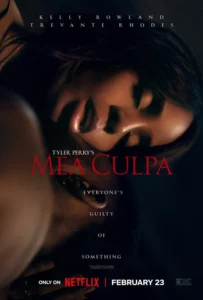Generation Black TV - Live
--- Main Blog Content Below ---
Tyler Perry’s latest movie “Mea Culpa” has sparked a whirlwind of controversies, from its depiction of sex scenes to its handling of themes surrounding black diversity, racial discrimination, and divorce. As audiences flock to theaters to witness Perry’s latest offering, the film has ignited discussions about representation, authenticity, and the responsibility of filmmakers in addressing sensitive topics. This article highlights the controversies surrounding “Mea Culpa,” exploring the nuanced discussions and implications for Perry’s storytelling legacy.
Sex Scenes: Balancing Intimacy and Authenticity
One of the most talked-about aspects of “Mea Culpa” is its depiction of sex scenes, which have divided audiences and critics alike. Some viewers praise Perry for his willingness to explore intimacy and sexuality in a raw and unfiltered manner, applauding the film’s commitment to authenticity. However, others argue that the sex scenes border on gratuitous and voyeuristic, detracting from the film’s narrative and undermining its emotional depth. The controversy surrounding the sex scenes in “Mea Culpa” underscores the complexities of portraying intimacy on screen and the fine line between authenticity and sensationalism.

Source: @tylerperry
Black Diversity: Representation and Stereotypes
Tyler Perry has long been praised for his commitment to showcasing the diversity of black experiences in his films. However, “Mea Culpa” has faced criticism for its portrayal of black characters, with some arguing that the film perpetuates harmful stereotypes and fails to accurately represent the complexity of black identity. Critics point to the lack of nuance in the characterization of black individuals, as well as the reliance on tropes and clichés that limit the diversity of black experiences on screen. The controversy surrounding black diversity in “Mea Culpa” highlights the ongoing need for authentic and multifaceted representation in cinema.
Racial Discrimination: Confronting Systemic Injustice
In “Mea Culpa,” Tyler Perry confronts the issue of racial discrimination head-on, exploring the ways in which systemic injustice impacts the lives of his characters. From microaggressions to overt acts of racism, the film exposes the harsh realities faced by black individuals in America and the toll that discrimination takes on their mental and emotional well-being. While some viewers commend Perry for addressing such an important issue, others argue that the film falls short in its portrayal of racial dynamics, relying on surface-level treatments of complex issues. The controversy surrounding racial discrimination in “Mea Culpa” underscores the challenges of addressing systemic injustice in a nuanced and impactful manner.

Source: @hollywoodmelanin
Divorce: Navigating Relationships and Conflict
At the heart of “Mea Culpa” lies the theme of divorce, as characters grapple with the complexities of relationships and conflict. Perry explores the emotional toll of divorce on individuals and families, delving into themes of betrayal, forgiveness, and reconciliation. While some viewers appreciate the film’s candid portrayal of marital struggles, others criticize its handling of divorce as melodramatic and sensationalized. The controversy surrounding divorce in “Mea Culpa” raises questions about the responsibility of filmmakers in depicting sensitive topics and the impact of their storytelling choices on audience perceptions.
In conclusion, Tyler Perry’s “Mea Culpa” has ignited a firestorm of controversies surrounding its depiction of sex scenes, black diversity, racial discrimination, and divorce. As audiences grapple with the complexities of Perry’s storytelling, the film serves as a catalyst for conversations about representation, authenticity, and responsibility in cinema. While “Mea Culpa” may be divisive in its treatment of sensitive topics, it also underscores the power of storytelling to provoke thought, spark dialogue, and challenge perceptions. As Perry continues to push boundaries and explore new territory in his filmmaking, audiences can expect more thought-provoking content that pushes them to confront uncomfortable truths and engage in meaningful discussions about the world we live in.

Source: @hollywoodmelanin
By: Victory Effiom
For the latest updates, Download P+us app available on Google App Store












